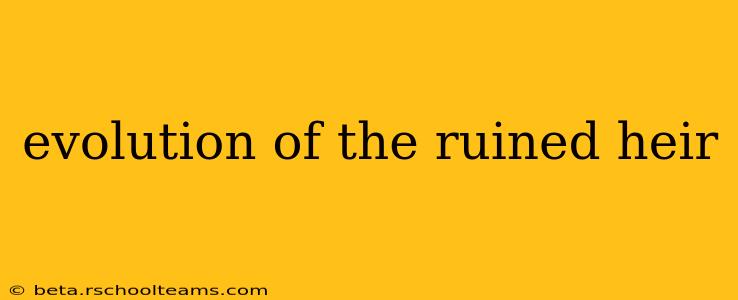The "ruined heir" trope, a staple in literature and storytelling across numerous genres, has undergone a fascinating evolution. Initially a figure of pathos, often defined solely by their downfall and loss of fortune, the ruined heir has blossomed into a far more nuanced and complex character archetype. This evolution reflects societal shifts, changing storytelling techniques, and a deeper understanding of human psychology. We'll explore this fascinating transformation, delving into the historical context and the modern interpretations of this classic character type.
What Defines a "Ruined Heir"?
Before examining its evolution, let's define the core elements of the "ruined heir" trope. Traditionally, this character is someone of noble birth or significant wealth who experiences a dramatic loss of status and fortune. This loss can stem from various sources: gambling debts, ill-advised investments, family betrayal, political upheaval, or even simple misfortune. The initial depiction often emphasizes the character's tragic fall from grace, highlighting the contrast between their former grandeur and current destitution.
The Classical Ruined Heir: A Study in Pathos
In classical literature and early storytelling, the ruined heir served primarily as a vehicle for exploring themes of fate, morality, and the fickle nature of fortune. These characters were often portrayed as passive victims, their downfall a result of external forces beyond their control. Think of the prodigal son in biblical narratives – his return home, though repentant, still signifies a loss of status. Their stories often evoke pity and sympathy, reinforcing the idea that societal standing and wealth are precarious and unreliable.
How did the fall from grace affect the character?
The impact of the fall from grace was typically depicted as complete and devastating. The ruined heir often faced social ostracism, poverty, and despair. Their once-privileged life was reduced to hardship, serving as a cautionary tale against hubris or the dangers of unchecked indulgence. This aspect of the trope often explores the themes of pride and humility, emphasizing the importance of moral lessons learned through suffering.
What were the common themes explored in stories featuring a ruined heir?
Common themes explored through these characters include the transience of wealth, the corrupting influence of power, and the importance of redemption. They provided a platform to examine societal structures and inequalities, highlighting the vulnerabilities of even the most privileged members of society. The narrative often centered around their struggle to adapt to their new reality, and occasionally their eventual redemption or reconciliation.
The Modern Ruined Heir: A Complex and Multifaceted Character
The modern interpretation of the ruined heir is significantly more sophisticated. While the loss of fortune remains central, the character's internal struggles and agency play a much more prominent role. Modern storytelling delves deeper into the psychology of the character, exploring their motivations, flaws, and capacity for growth.
How has the character's agency evolved?
Unlike their passive classical counterparts, modern ruined heirs often possess a greater degree of agency. Their downfall might be self-inflicted, stemming from poor choices or character flaws, but they actively participate in shaping their own narratives. They may fight to reclaim their former status, or, alternatively, they may choose to forge a new path, rejecting the values of their past life.
What are the modern interpretations of the ruined heir?
Modern interpretations frequently move beyond simplistic morality tales. The ruined heir might be morally ambiguous, possessing both admirable and reprehensible traits. Their stories become explorations of identity, resilience, and the complexities of human nature. The focus shifts from merely documenting the fall to examining the character's journey of self-discovery and adaptation in the face of adversity. This evolution allows for more compelling and relatable characters.
The Future of the Ruined Heir Trope
The "ruined heir" will likely continue to evolve as storytelling itself evolves. Expect to see even more nuanced and complex portrayals, reflecting our increasingly sophisticated understanding of the human condition. Expect to see more diverse interpretations of the circumstances leading to their ruin, and more creative explorations of their resilience and adaptation. The core of the trope – the dramatic fall and subsequent journey – will remain compelling, but the specifics will continue to reflect the changing landscape of modern storytelling.
